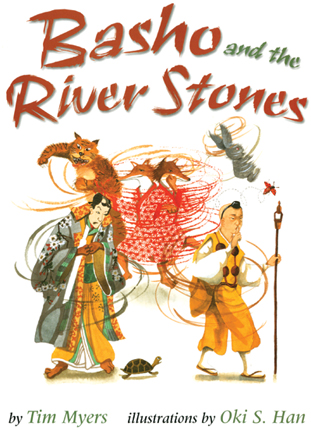Full Text Reviews: Bulletin for the Center... - 11/01/2004 Basho and the foxes live in relative harmony in the Fuka River region of Japan; he willingly shares the fruit of his cherry tree with the foxes, and they leave him in peace to work on his poetry. That is, until one "impatient and greedy" fox decides to play a trick on Basho. Transforming himself into a wandering monk, he convinces the poet to sign over all rights to the cherry tree in exchange for three coins that, in fact, are transformed river stones. When the gold turns back into stones the next morning, the kindhearted Basho responds mildly, by writing a haiku, which, he explains, "lasts much longer" than money. The mortified fox, upon hearing the results of his trickery, begs forgiveness of the gentle poet and tries to pay him with three real coins. Basho denies the offer of money but willingly accepts the fox's second offer of three river stones . . . which magically transform into the same three coins the following day. This original tale is creatively patterned to lead the fox through clear levels of greed, then humility, then generosity, and the ending, wherein the fox uses his power for good rather than the satisfaction of his own needs, is both imaginative and satisfying. The layout is somewhat cluttered, with text appearing in bordered boxes against busy watercolors, and the text is inconsistently proportioned, with some pages offering a single line and others several paragraphs. Han's watercolors, encompassing a rich, dark palette, effectively invoke the Japanese setting, full of lush gardens and spare architecture; the anthropomorphization of the foxes (they walk upright and wear patterned silk robes) is, however, rather discordant. The fox's evolution is the real strength of the story, and this would work well in juxtaposition with more traditional fox-as-trickster folktales where there is no redemption to be had. An author's note about the historical figure of Basho is included. - Copyright 2004 The Board of Trustees of the University of Illinois. School Library Journal - 10/01/2004 Gr 1-4-A magical fox learns an important lesson in this original trickster tale. Disguised as a monk, he offers Basho, Japan's most revered poet, three gold coins if he agrees to give all of the cherries from his tree to the neighboring foxes. When the coins turn into river stones, the mischievous creature awaits the impoverished poet's angry outburst. However, Basho's profound appreciation of the stones' beauty takes the form of a haiku, which humbles the animal. Chagrined, he tries to give Basho three real coins, which the man summarily refuses. The fox uses his wiles to repay the poet in yet another transmogrification, and they live companionably from that day on. Han's watercolors are adept at capturing the beauty of the Japanese countryside, the serenity of Basho's hut, and the cunning expression of the fox/monk. Stylized frames separate the text from the lush backgrounds of shade-dappled pastoral scenes and striking kimono-silk patterns. The description of haiku on the title page and the appended author's note about Matsuo Basho provide just the right amount of supplemental information. Myers's storytelling background is apparent in the pacing of the tale and in the carefully selected, descriptive narrative. An exotic and eye-catching addition to storytimes.-Carol Ann Wilson, Westfield Memorial Library, NJ Copyright 2004 Reed Business Information. - Copyright 2004 Publishers Weekly, Library Journal and/or School Library Journal used with permission. Booklist - 11/01/2004 In this team's second tribute to Matsuo Basho (Basho and the Fox , 2000), the seventeenth-century Japanese poet befriends a clan of kimono-clad foxes and agrees to share his cherry harvest with them. One fox becomes greedy, however, and devises a plan to trick Basho out of his share. By transforming himself into a monk, the fox temporarily turns three worthless stones into gold coins, and tempts the poor, hungry poet with coins for cherries. Is Basho angry when the coins turn back into rocks? Yes! But he quickly becomes both grateful and inspired, as he recognizes the beautiful stones' true worth and writes a haiku about them. The conniving fox is humbled by the poet's attitude and does everything he can to ensure that his trickery is undone. Along the way, he learns a lesson or two about perception, honor, and sharing. Han's expressive watercolors, with an unusual variety of perspectives, keep the story lively. A clever original fable that ends with cherries for everyone. An author's note is appended. - Copyright 2004 Booklist. Loading...
|



